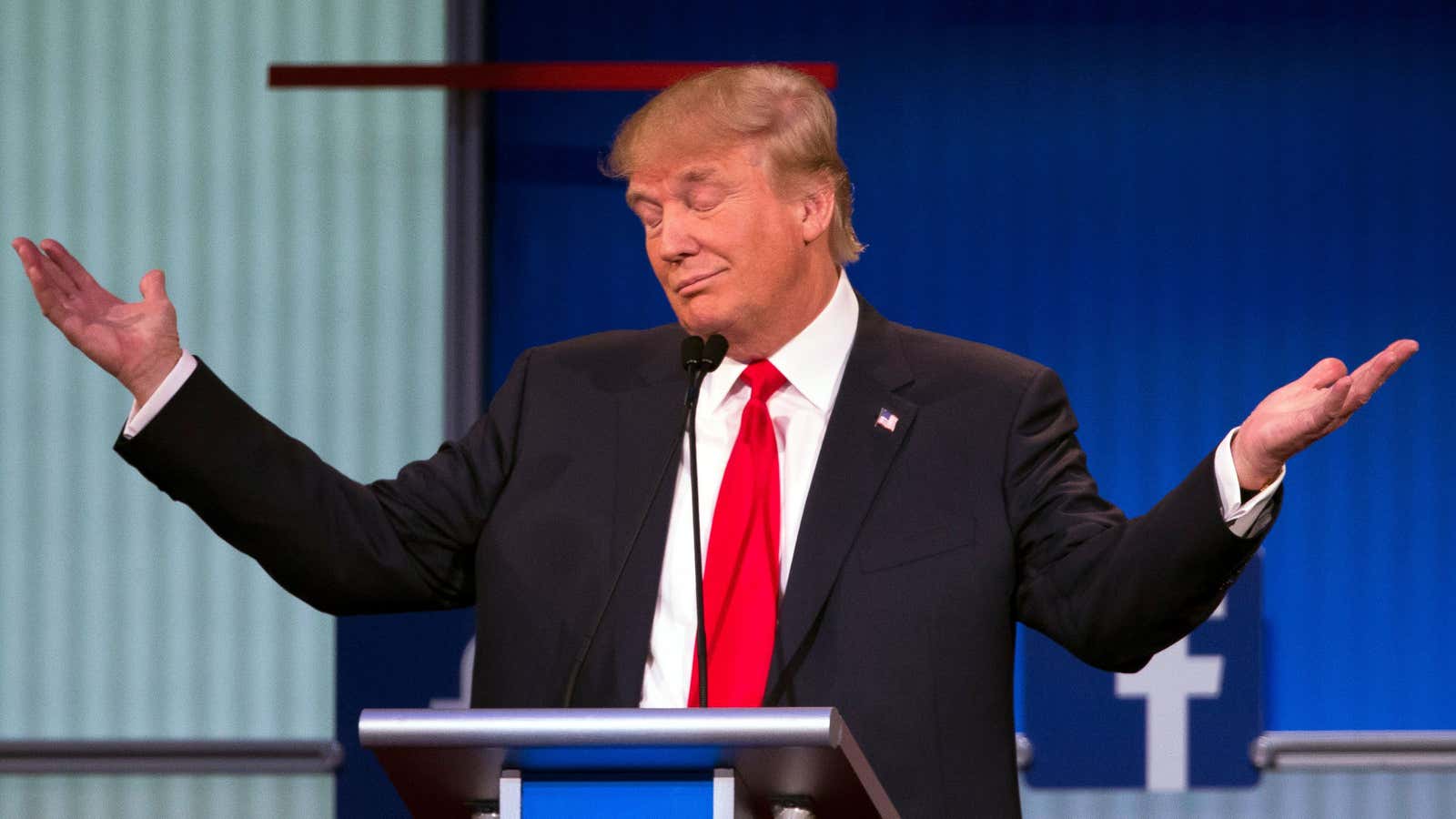Donald Trump had lots to say at the first Republican presidential debate, but one comment in particular was hailed as insight. When the outspoken entertainer was asked about his past political donations, including to members of the rival Democratic party, and specifically Hillary Clinton, he had this to say:
Before this, before two months ago, I was a businessman. I give to everybody. When they call, I give. And you know what? When I need something from them, two years later, three years later, I call them. They are there for me. And that’s a broken system…I’ll tell you what. With Hillary Clinton, I said, be at my wedding and she came to my wedding. You know why? She had no choice! Because I gave.
And, indeed, many executives seek influence by donating to politicians across the ideological spectrum. But are they buying favors the way The Donald describes? It’s just not that simple, and that is where Trump, and many Americans, get political corruption wrong.
There’s little doubt that in the US, economic power translates into political power in ways that are antithetical to democracy and the public interest. In some of the more recent research into this, political scientists at Princeton and Northwestern tested several theories of American politics (pdf) and found that the most influential people in the US are economic elites and, to a smaller extent, business interest groups. But researchers aren’t sure how the influence plays out; some studies find significant influence from donations, some find none.
Are the wealthy politically powerful because they buy votes? Or is it because more than half of US lawmakers are millionaires themselves? Was Hillary Clinton at Donald Trump’s wedding because, as he says, he gave her a donation? Or was it because she was a New York senator with a millionaire husband moving in the same social circles as New York billionaire Trump, as her staff says? It’s hard to know, either way.
In fact, it’s difficult for political scientists to figure out if campaign contributions lead to votes (pdf) or if votes lead to political contributions. Some theories of political contributions see them as a signaling device for already-likeminded politicians—they get money from interest groups not just to fund their political activities but also to demonstrate their credentials on policy issues.
Some economists even argue that campaign contributions are actually extorted from businesses by politicians, in return for blocking legislation that would take away value from their enterprises. By this theory, Trump isn’t a savvy player of the political system, but a dupe being fleeced by Clinton.
Consider the recent example of the US Chamber of Commerce, one of the most politically powerful organizations in the country. In the 2014 congressional election cycle, it gave $450,000 to candidates, spent $35 million to support political campaigns, and spent $124 million on lobbying.
But its top political priorities—including protecting the US Export-Import Bank, passing business-friendly tax reform, allowing more skilled foreign workers, and expanding infrastructure investment—are all dead in the water, often because the very Republican majority it empowered has taken an ideological turn that questions the Chamber’s priorities.
Ideology and other complications in the US political system also demand a more complicated understanding of wealth and influence: The interactions of spending on campaign donations and lobbying together may provide a clearer path of understanding the market for influence, while the design of institutions like legislatures and political parties plays a role as well. It also depends on the issue at hand; some studies suggest legislators are particularly susceptible to corporate influence when their constituents don’t actually care much about the issue itself.
“Rather than asking whether contributions have influence, we should ask when and where they have influence,” writes Lynda Powell, a political scientist who has authored a book on political donations. “Contributions have little influence in some circumstances and considerable influence in others.”
Though Trump may have evidence of a specific favor he secured with his largesse, it seems he’s had little influence on policy. For all his billions, US lawmakers never came close to enacting his proposals for a massive wealth tax or a single-payer health care system. Indeed, if buying politicians is so effective, perhaps Trump wouldn’t need to run for office himself.
Or maybe, just maybe, the top job in the White House isn’t the real motivation behind this campaign. Perish the thought.
